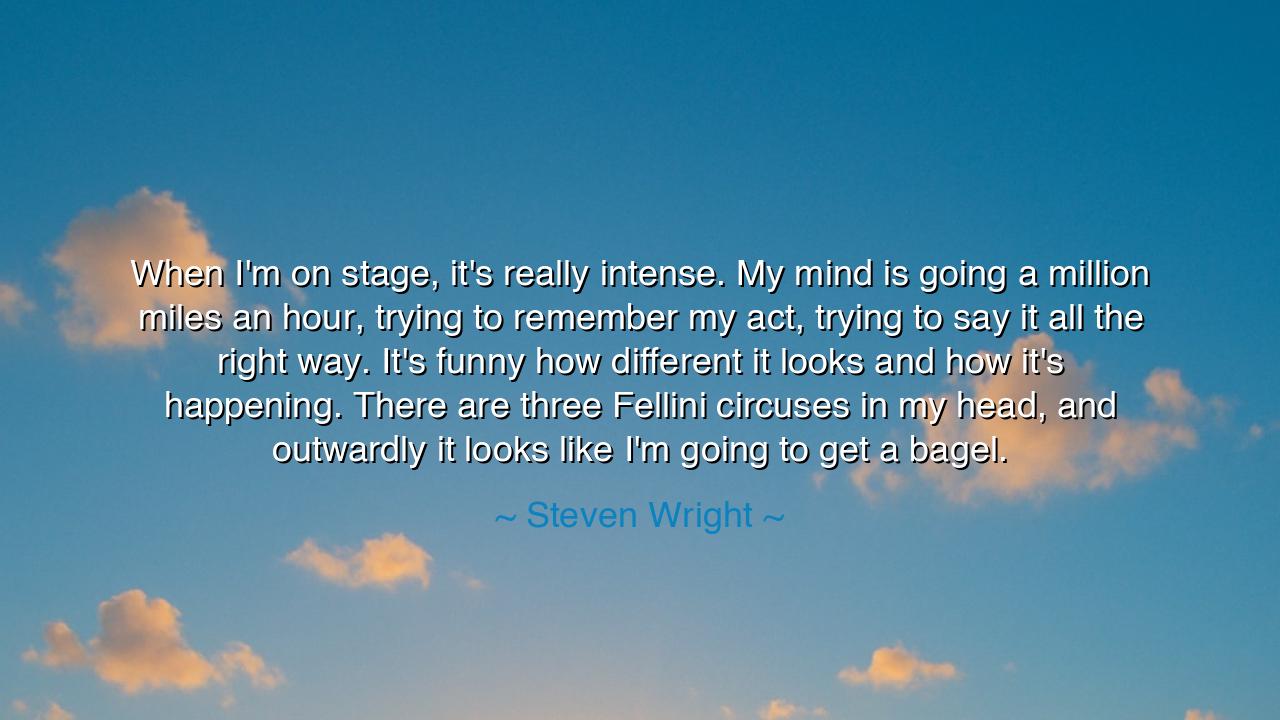
When I'm on stage, it's really intense. My mind is going a
When I'm on stage, it's really intense. My mind is going a million miles an hour, trying to remember my act, trying to say it all the right way. It's funny how different it looks and how it's happening. There are three Fellini circuses in my head, and outwardly it looks like I'm going to get a bagel.






In the words of Steven Wright, “When I’m on stage, it’s really intense. My mind is going a million miles an hour, trying to remember my act, trying to say it all the right way. It’s funny how different it looks and how it’s happening. There are three Fellini circuses in my head, and outwardly it looks like I’m going to get a bagel.” — we are invited into the paradoxical world of the performer: the collision of chaos and calm, the unseen tempest that rages beneath the still surface of art. Wright, master of deadpan humor and quiet absurdity, unveils through this reflection the eternal mystery of appearance versus reality — that behind serenity often hides great struggle, and beneath simplicity often lies the brilliance of complexity.
The meaning of this quote lies in its revelation of the dual nature of mastery. The true artist, whether comedian, poet, or warrior, often seems composed to the onlooker — unbothered, effortless, natural. Yet within, the mind is aflame, navigating memory, emotion, and precision all at once. Wright’s humor here conceals deep wisdom: that the work of creation, though it may appear tranquil, is a storm of concentration and instinct. To the audience, he may seem calm, even detached, “like he’s going to get a bagel.” But in truth, his inner world is alive with motion, his thoughts like circuses, wild and competing for balance. The Fellini reference — a nod to the great Italian filmmaker whose films celebrated surrealism, spectacle, and chaos — perfectly captures this contrast between the ordinary and the fantastical that defines both comedy and life itself.
This paradox is ancient and universal. In the teachings of the Stoics, the wise man was described as appearing serene amid turmoil — unshaken not because his world was quiet, but because he had learned to master the noise within. Marcus Aurelius, the philosopher-emperor, wrote each night in his journal, wrestling with his fears and doubts, even as his subjects saw him as the embodiment of calm authority. So it is with Wright’s stage presence: the stillness is not the absence of motion but the result of discipline, a harmony born of chaos. The true master does not silence the storms of the mind; he conducts them.
The origin of Wright’s insight comes from the very nature of comedy itself — that fragile art of timing, tone, and tension. To make others laugh is not simply to speak jokes, but to balance energy and silence, to find rhythm in unpredictability. The comedian must think faster than the laughter, anticipating reactions before they arrive, shaping each pause as carefully as each word. To the audience, it all feels effortless. But in truth, the performer walks a razor’s edge between brilliance and collapse. Wright’s humor — slow, flat, philosophical — hides that he, too, battles the same chaos as those who shout or flail. His stillness is not emptiness; it is mastery.
Consider, too, the ancient story of the swordsman Miyamoto Musashi, who once said, “Under a serene sky, I have fought battles unseen.” On the surface, his calm was absolute; within, his mind burned with alertness. The same spirit lives in Wright’s confession — that behind every composed artist, behind every quiet face, there is a battlefield of thought. The circus of the mind is not a sign of weakness, but of awareness — the recognition that to create something graceful, one must wrestle with the chaotic forces beneath it.
The lesson here, then, is both humbling and empowering: what appears simple is often the result of immense inner labor. Do not envy the one who makes it look easy, for ease is born from years of unseen struggle. Whether on the stage, in work, or in life, do not fear the Fellini circus within you — the overlapping thoughts, the doubts, the urgency. These are the fires that forge clarity. The key is not to eliminate them, but to move through them with purpose. The stillness others see is not the absence of motion, but the mastery of it.
Therefore, my friends, learn from Steven Wright’s wisdom. In your pursuits — whether speaking, creating, or leading — do not be deceived by appearances, in yourself or in others. Behind every calm exterior lies a heart at work, and behind every great work lies a thousand unseen battles. When your mind races, when your thoughts collide like circus performers in the ring, do not despair. Remember that even the greatest performers carry chaos within — and that true art, true wisdom, is the ability to walk through that chaos with grace.
And so, when Wright says, “It’s funny how different it looks and how it’s happening,” he gives us not merely a glimpse into comedy, but a reflection on life itself. Outwardly, we may seem composed, even ordinary. But within, each of us carries our own circus — a wild and wondrous dance of thoughts, fears, and dreams. The secret, as the ancients knew, is not to silence the noise, but to turn it into rhythm. For it is within that tension — between the circus and the calm, between chaos and composure — that the true beauty of being human is found.






AAdministratorAdministrator
Welcome, honored guests. Please leave a comment, we will respond soon